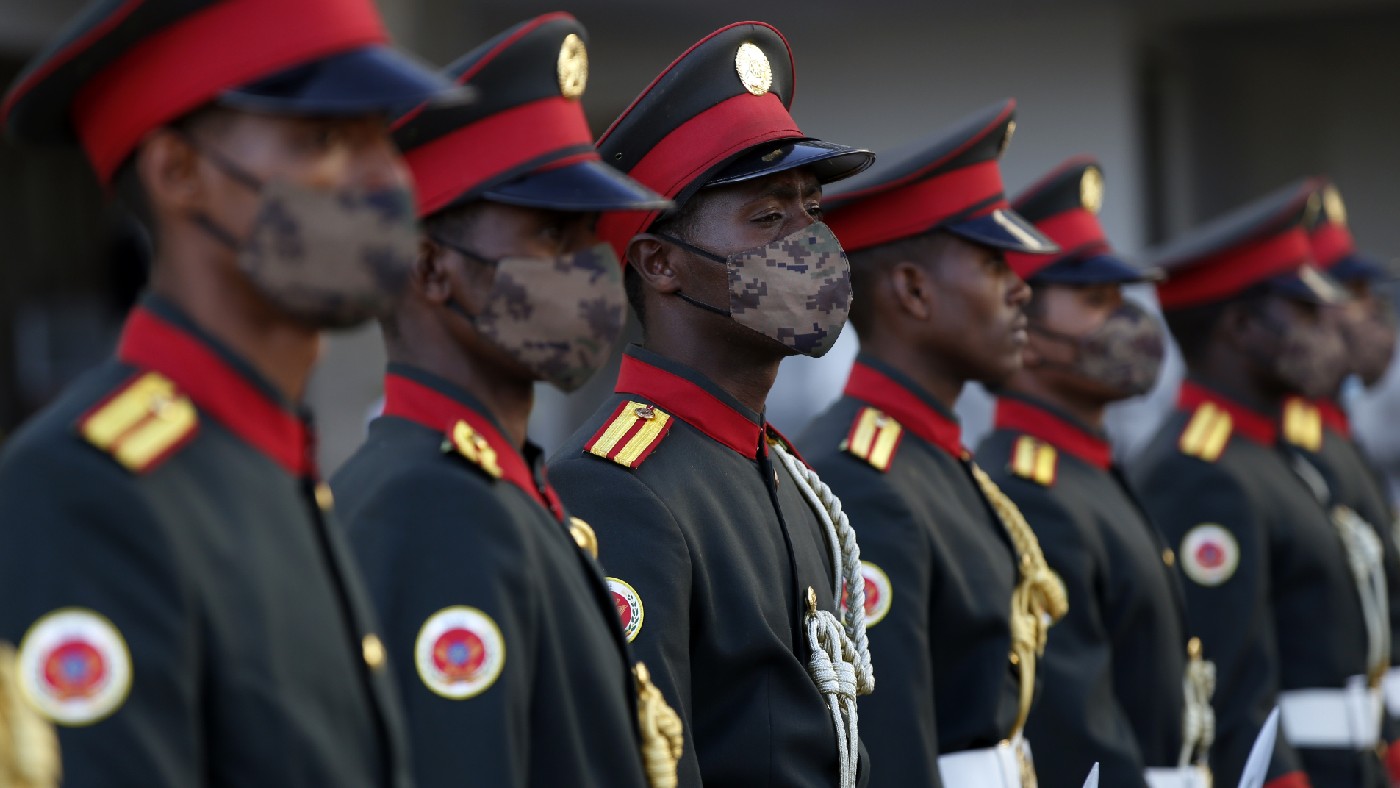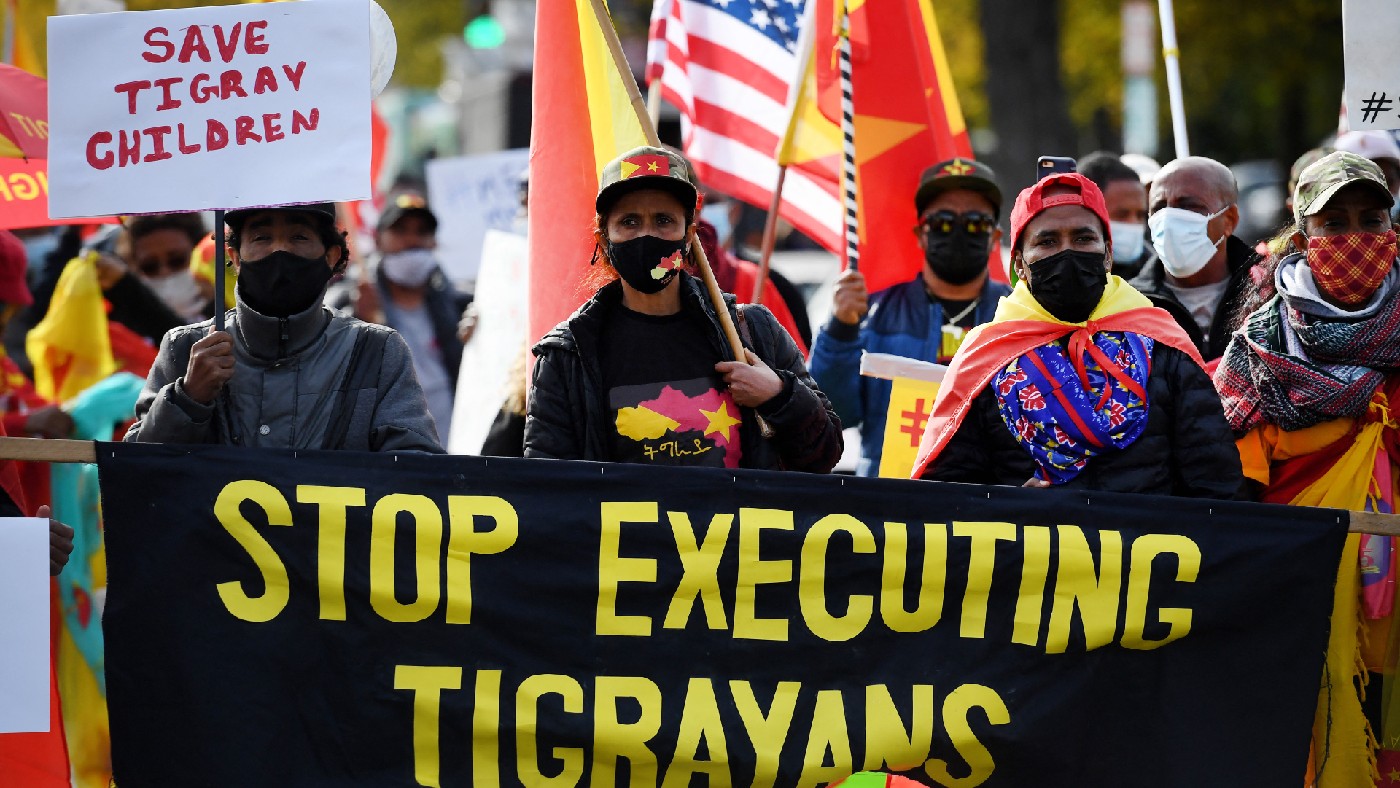Ethiopia’s civil war: how the country is on the brink of ‘irreversible state collapse’
The basic issue is how much autonomy Ethiopia’s regions should have

A free daily email with the biggest news stories of the day – and the best features from TheWeek.com
You are now subscribed
Your newsletter sign-up was successful
Ethiopia is facing an “existential crisis”, said Haitham Nouri in Al-Ahram (Cairo). As the country’s civil war entered its second year this month, the rebel Tigray People’s Liberation Front (TPLF) was advancing deep into territory controlled by federal forces, and threatening to march on the capital Addis Ababa.
On Facebook, Prime Minister Abiy Ahmed called on all Ethiopians “to organise and march... using every weapon and power... to prevent, reverse and bury the terrorist TPLF”. The war had begun last November with Abiy promising a swift operation to bring the rebellious northern Tigray region under control.
He declared victory within a month; but since then, the TPLF has launched an astonishing fightback. It has created a rebel alliance with the Oromo Liberation Army (OLA), drawn from the nation’s largest ethnic group, which last week was 150 miles from the capital. Most of the inhabitants of Addis Ababa are Amhara, the nation’s second-largest group, under whose leadership the country was united in the 19th century. They still “dominate the country’s political elite and middle class and therefore fear revenge from the Tigray and other groups”.
The Week
Escape your echo chamber. Get the facts behind the news, plus analysis from multiple perspectives.

Sign up for The Week's Free Newsletters
From our morning news briefing to a weekly Good News Newsletter, get the best of The Week delivered directly to your inbox.
From our morning news briefing to a weekly Good News Newsletter, get the best of The Week delivered directly to your inbox.
As well they might, said Robbie Corey-Boulet in The Mail & Guardian (Cape Town). The war was brutal; the federal army and its Eritrean allies were accused of committing mass atrocities against Tigrayans. And “a mostly hidden feature” of the civil war since has been “a mass campaign of arbitrary arrests” targeting Tigrayans in Addis Ababa and elsewhere in Ethiopia.
The government has described it as a legitimate operation to stamp out TPLF terrorist cells, but reports suggest an “indiscriminate operation” ensnaring everyone from soldiers to day labourers to clergymen. “TPLF-supporting” businesses (i.e. those owned by Tigrayans) have been closed down. Amnesty International reports that more than 1,000 people are held at one camp in squalid conditions. Military courts have handed down death sentences to “traitorous” Tigrayan officers.

If Addis Ababa falls, there is a risk of major ethnic strife, said The Nation (Nairobi). “A mosaic of more than 80 ethnicities, Ethiopia may find itself mirroring the fate of the former Yugoslavia.” As the TPLF advances, it is likely to “encounter stiff resistance from Amhara military fighters who have mobilised in large numbers”. But taking the capital “may not be what the rebels have in mind”.
They have captured the strategic towns of Dessie and Kombolcha in Amhara, and are moving east to capture the road to the port of Djibouti. This would ease humanitarian access to Tigray, where the UN says hundreds of thousands are on the brink of famine – thanks, the TPLF claims, to a government blockade. Capturing the road would also allow Tigrayan fighters to block the crucial supply route to Addis Ababa. “The strategy seems to be to strangle Addis rather than take it.” This would put the rebels in a stronger position for future negotiations.
A free daily email with the biggest news stories of the day – and the best features from TheWeek.com
There is little prospect of a ceasefire, said The Addis Standard. Abiy is demanding that the TPLF withdraw to Tigray, and recognise the government’s legitimacy. The TPLF has rejected those demands.
There are “no easy solutions”, said Seifudein Adem in Foreign Policy (Washington DC). The basic issue is how much autonomy Ethiopia’s regions should have. The TPLF, which was in power until 2018, dismantled Amhara dominance of Ethiopia. The Amhara – ironically, led by an Oromo PM, Abiy – want to restore it. Ethiopia is now on the brink of “irreversible state collapse, which would also have regionwide consequences”. It “is reaching a stage where it cannot save itself”.
Ideally, the African Union would step in to save it, but it is headquartered in Addis Ababa, and is “unlikely to upset its host”. The idea of US intervention – American forces are stationed in Djibouti – is unpopular. But in truth, “only the West has the willingness and capacity to rescue the Ethiopian state from devouring its own citizens – and eventually itself”.
-
 Why are election experts taking Trump’s midterm threats seriously?
Why are election experts taking Trump’s midterm threats seriously?IN THE SPOTLIGHT As the president muses about polling place deployments and a centralized electoral system aimed at one-party control, lawmakers are taking this administration at its word
-
 ‘Restaurateurs have become millionaires’
‘Restaurateurs have become millionaires’Instant Opinion Opinion, comment and editorials of the day
-
 Earth is rapidly approaching a ‘hothouse’ trajectory of warming
Earth is rapidly approaching a ‘hothouse’ trajectory of warmingThe explainer It may become impossible to fix
-
 Corruption: The spy sheikh and the president
Corruption: The spy sheikh and the presidentFeature Trump is at the center of another scandal
-
 Putin’s shadow war
Putin’s shadow warFeature The Kremlin is waging a campaign of sabotage and subversion against Ukraine’s allies in the West
-
 The fall of the generals: China’s military purge
The fall of the generals: China’s military purgeIn the Spotlight Xi Jinping’s extraordinary removal of senior general proves that no-one is safe from anti-corruption drive that has investigated millions
-
 Epstein files topple law CEO, roil UK government
Epstein files topple law CEO, roil UK governmentSpeed Read Peter Mandelson, Britain’s former ambassador to the US, is caught up in the scandal
-
 Iran and US prepare to meet after skirmishes
Iran and US prepare to meet after skirmishesSpeed Read The incident comes amid heightened tensions in the Middle East
-
 Syria’s Kurds: abandoned by their US ally
Syria’s Kurds: abandoned by their US allyTalking Point Ahmed al-Sharaa’s lightning offensive against Syrian Kurdistan belies his promise to respect the country’s ethnic minorities
-
 Israel retrieves final hostage’s body from Gaza
Israel retrieves final hostage’s body from GazaSpeed Read The 24-year-old police officer was killed during the initial Hamas attack
-
 China’s Xi targets top general in growing purge
China’s Xi targets top general in growing purgeSpeed Read Zhang Youxia is being investigated over ‘grave violations’ of the law